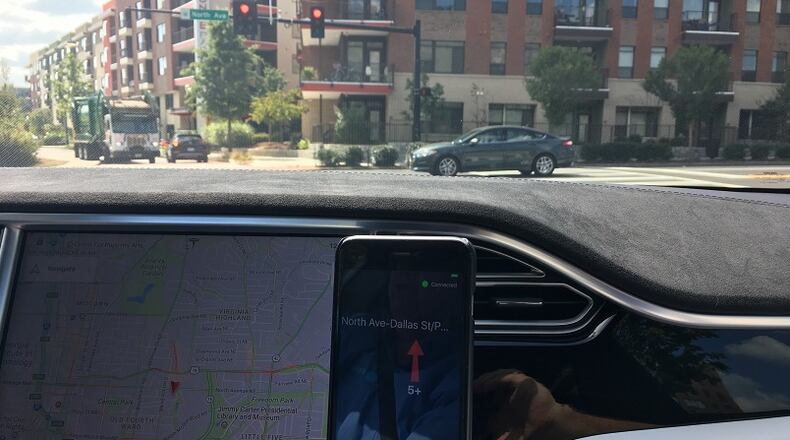The proliferation of smartphones in the last 10 years has turned industries sideways and made convenience ubiquitous. But smartphones and traffic often draw a negative connotation, because of distracted driving. While that will likely stay a growing problem for years to come, the city of Atlanta and a Suwanee technology company are finding ways use your smartphone and smart car to make traveling safer.
In December 2016, we talked to Renew Atlanta head, Faye DiMassimo, about the city’s grant to make North Avenue a “smart corridor” between Georgia Tech and Ponce City Market. DiMassimo, who also manages Atlanta’s TSPLOST projects, and her team hired Suwanee company Applied Information. Its main role on North Avenue is to make traffic signals communicate with phones and cars.
“There’s a box in each of these intersections, connecting the intersection to the cloud and through the cloud, connecting the intersection to the Travel Safely application on your phone,” A.I. President Bryan Mulligan said as he displayed this technology, while driving his autonomous Tesla Model S on this stretch.
A piece of Applied Information’s equipment reads the light’s traffic controller and learns the status of the light and the countdown timer for when it changes. This is extremely helpful when a light is obscured or when people are illegally texting at a light, as the Travel Safely App will receive this data and talk to the driver. This also helps autonomous vehicles navigate and make better decisions.
Smart signal technology makes traffic safer, but how does it move faster?
“They’ve adopted adaptive traffic signals. And what they’re trying to do is get a higher percentage of the lights to be green,” Mulligan explained.
Engineers at Georgia Tech study the data this technology produces to see if indeed and how much this connected innovation helps. With more connected technology, data is more precise and traffic planning has a better baseline.
The convenience of the Travel Safely App alerting drivers, should simply decrease traffic, by boosting driver awareness, Mulligan said. Commuters will be much more alert when a light turns green, as many pause illegally at lights to check their phones. “If we just save one or two seconds in the light going green, we’ll have created 5-10 percent more capacity on the roadway, without any additional cost.”
Both the cities of Atlanta and Marietta are outfitting some firetrucks and firehouses with this smart technology, to increase their response time, without shelling out hundreds of thousands of dollars to build new firehouses. MARTA is exploring this technology for both its buses and the Atlanta Streetcar, which MARTA will soon begin operating. More green lights, means better service on all fronts.
North Avenue also has smart pedestrian signals, so those crossing the street do not have to press a button. And Mulligan revealed that this technology will speak to motorists when they are approaching occupied crosswalks and when cyclists are nearby.
A few states are working with the U.S. Department of Transportation to develop these smart technologies, but Atlanta’s project is groundbreaking, as they are working on a local level with grant money.
“What Atlanta has done is seize the initiative of a city that is trying to take control of its own future, by producing some grant money,” Mulligan said adding that this leads businesses in the autonomous technology industry to choose Atlanta. “I can confidently say that Atlanta is leading the nation with the deployment of these smart technologies to attract commerce.”
Whether smart lights are communicating with mobile devices or self-driving cars, the North Avenue smart corridor should improve traffic and safety, as more people connect with it. A.I. is beta-testing the app now and both it and the corridor should be in full operation in early 2018. Mulligan explained that the app runs in the background and is fully functional while other apps, like WSB’s Triple Team Traffic Alerts App, also guide drivers.
Mulligan said he believes that if the North Avenue corridor is successful, that Atlanta will equip every intersection the same way. Other cities and counties are also exploring the technology.
Learn more about beta-testing this app on TravelSafelyApp.com.
Hear Bryan Mulligan's full interview on the North Avenue smart corridor and autonomous driving on the most recent episode of the WSB Traffic Podcast: on-ajc.com/gridlock_podcast
About the Author
The Latest
Featured
